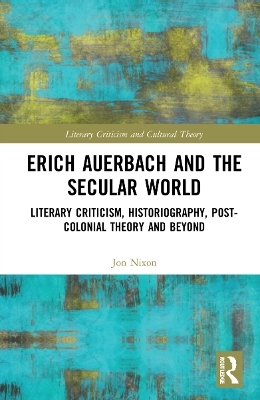
Erich Auerbach and the Secular World
Literary Criticism, Historiography, Post-Colonial Theory and Beyond
Seiten
2022
Routledge (Verlag)
978-0-367-52838-6 (ISBN)
Routledge (Verlag)
978-0-367-52838-6 (ISBN)
Erich Auerbach was a Jewish refugee who in exile in Istanbul during WWII wrote one of the major works of 20th Century literary criticism. This book explores the major themes of his life’s work, relates that work to his own life history, and explains his enduring relevance within the field of literary and cultural theory.
Auerbach was one of the foremost literary critics of the 20th century whose work has relevance within the fields of literary criticism, historiography and postcolonial theory. The opening chapter of this book explains how he understood the task of interpretation and his role as an interpreter. The following chapter outlines the important phases in his life with reference to the writers and thinkers who influenced him in his thinking and practice. The central chapters of the book focus on specific themes in his work: the historical grounding of the ‘figural’ imagination; the relation between the secular and the sacred; the emergence of tragic realism; and the notion of ‘inner history’ as a defining feature of early 20th-cenntury modernism. The final two chapters focus on broader issues relating to the development of Auerbach’s understanding of the development of an educated readership within Europe and of his concerns regarding the emergence of what he terms ‘a world literature’.
Auerbach was one of the foremost literary critics of the 20th century whose work has relevance within the fields of literary criticism, historiography and postcolonial theory. The opening chapter of this book explains how he understood the task of interpretation and his role as an interpreter. The following chapter outlines the important phases in his life with reference to the writers and thinkers who influenced him in his thinking and practice. The central chapters of the book focus on specific themes in his work: the historical grounding of the ‘figural’ imagination; the relation between the secular and the sacred; the emergence of tragic realism; and the notion of ‘inner history’ as a defining feature of early 20th-cenntury modernism. The final two chapters focus on broader issues relating to the development of Auerbach’s understanding of the development of an educated readership within Europe and of his concerns regarding the emergence of what he terms ‘a world literature’.
Jon Nixon is a Visiting Professor at Middlesex University, UK, and writes within the field of intellectual history and cultural and political theory. His recently authored books include Hannah Arendt: the Promise of Education; Rosa Luxemburg and the Struggle for Democratic Renewal; Gadamer: The Hermeneutical Imagination; and Hannah Arendt and the Politics of Friendship.
Introduction: Why Auerbach matters – and why now
Chapter 1 The interpretive task
Chapter 2 Outlines of a life
Chapter 3 Figural imagination
Chapter 4 The spiritual and the secular
Chapter 5 Tragic realism
Chapter 6 Inner history
Chapter 7 An educated public
Chapter 8 Widening horizons
Coda: Learning from Auerbach
Appendix: Chronology of Auerbach’s life and works
| Erscheinungsdatum | 11.05.2022 |
|---|---|
| Reihe/Serie | Literary Criticism and Cultural Theory |
| Verlagsort | London |
| Sprache | englisch |
| Maße | 152 x 229 mm |
| Gewicht | 394 g |
| Themenwelt | Geisteswissenschaften ► Geschichte |
| Geisteswissenschaften ► Sprach- / Literaturwissenschaft ► Anglistik / Amerikanistik | |
| Geisteswissenschaften ► Sprach- / Literaturwissenschaft ► Literaturwissenschaft | |
| ISBN-10 | 0-367-52838-X / 036752838X |
| ISBN-13 | 978-0-367-52838-6 / 9780367528386 |
| Zustand | Neuware |
| Haben Sie eine Frage zum Produkt? |
Mehr entdecken
aus dem Bereich
aus dem Bereich
Poetik eines sozialen Urteils
Buch | Hardcover (2023)
De Gruyter (Verlag)
CHF 83,90
Entzauberung und Faszination des Immergleichen in Literatur und Film
Buch | Softcover (2024)
Springer Fachmedien Wiesbaden GmbH (Verlag)
CHF 118,95
Buch | Softcover (2024)
belleville (Verlag)
CHF 27,95


